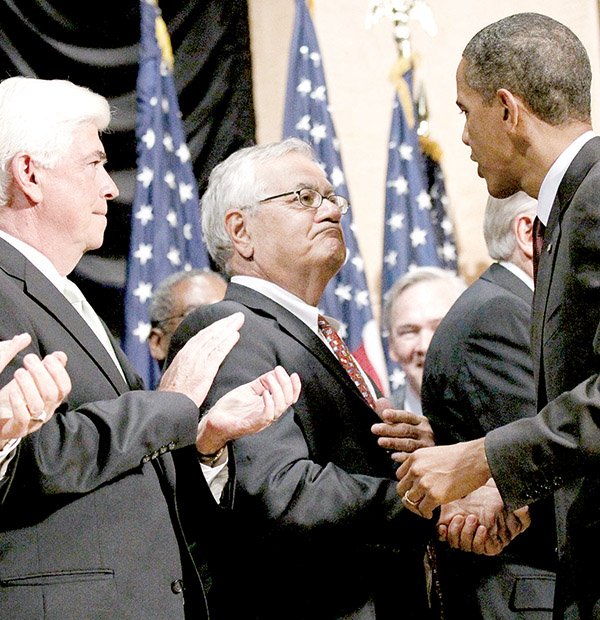WASHINGTON — The Senate voted 59-39 Wednesday to restore emergency jobless benefits to millions of people who have been out of work for more than six months. U.S. House leaders say they will ratify the measure today and send it on to the White House.
President Barack Obama is expected to quickly sign the bill, which would authorize states to provide retroactive support to an estimated 2.5 million people who have seen theirunemployment checks cut off since federal benefits expired June 2. It would also make available up to 99 weeks of income support through the end of November to millions more who have exhausted state benefits, which typically last for 26 weeks. Advocates for the unemployed say it could be several weeks in some states before the checks are in the mail.
Interactive
Under best-case scenarios, unemployed people who have been denied jobless benefits can expect retroactive payments as early as next week in some states.
Sens. Blanche Lincoln and Mark Pryor, both DArk., voted for the bill. The jobless rate in Arkansas was 7.5 percent in June.
Maine’s Sens. Olympia Snowe and Susan Collins were the only Republicans to support the bill Wednesday. Sen. Ben Nelson of Nebraska was the only Democrat to break with his party to oppose it.
The vote comes after a months-long election-year battle over whether to pay for the $34 billion measure with unspent funds or to add that sum to the nation’s mounting national debt. Both parties have tradi-tionally agreed not to pay for emergency jobless benefits during periods of high unemployment, in part because cutting spending or raising taxes to cover the cost could further depress economic activity. But the recent recession, coupled with federal stimulus spending to revive the economy, has pushed government debt loads here and abroad into dangerous territory, sparking a crisis in Europe and heightening public anxiety in the United States.
Republicans agreed that jobless benefits should be extended but argued that the cost should be covered with unexpended funds from last year’s economic-stimulus package.
“Should we finance this $34 billion obligation in the short term with a loan froma foreign government and pass the tab on to our kids and grandkids?” said Sen. Jon Kyl of Arizona, the chamber’s second-ranking Republican. “Or should we pay for it now by cutting other federal spending?”
Democrats, meanwhile, have accused the GOP of playing politics with the lives of millions of unemployed workers, noting that Republicans want to extend tax cuts for the wealthy that would add nearly 20 times as much to the nation’s debt over the next decade.
“Millions are waiting for a fraction of their old income checks that help them put food on the table, keep the roof over their heads,” said Senate Majority Leader Harry Reid, whose home state of Nevada had the nation’s worst unemployment rate in June at 14.2 percent. The nationwide rate was 9.5 percent.
The Senate cleared the way for Wednesday’s passage when the swearing-in Tuesday of the late Sen. Robert Byrd’s successor, Carte Goodwin of West Virginia, gave Democrats the last vote needed to break the Republican filibuster.
Snowe and Collins were the only Republicans on Tuesday to vote to shut down their party’s filibuster; Nelson was the only Democrat to side with Republicans. His state has a 4.9 percent unemployment rate, the nation’s third-lowest.
In states like Pennsylvania and New York, the back payments should go out next week, officials said. In others, like Nevada, it may take a few weeks for all of those eligible to receive benefits, said Mae Worthey, a spokesman for the Department of Employment, Training and Rehabilitation.
In North Carolina, Employment and Income Department spokesman Andrew James said to expect a wait oftwo to six weeks.
The bill would push total unemployment benefits spending this year to more than $130 billion, a 50 percent increase from last year, according to the nonpartisan Congressional Budget Office.
Democrats dropped other unemployment-aid provisions because of complaints about the cost. Those included a 65 percent subsidy created last year to help the jobless buy health insurance through their former employers. It benefited 2 million households last year, according to the Treasury Department.
Also eliminated were an additional $25 weekly jobless benefit that was part of last year’s economic stimulus and a tax exemption for the first $2,400 in unemployment aid.
Democrats don’t plan to extend aid to the growing number of Americans who have already received the maximum 99 weeks of allowable aid. Other jobs-related provisions, including aid to states struggling with their budgets, were dropped amid cost concerns.
“We have stripped this measure down to the bare essentials,” said Senate FinanceCommittee Chairman Max Baucus, D-Mont.
Many Republicans have voted in the past for deficit-financed benefits extensions, including as recently as March and twice in 2008, during the Bush administration. But now they are casting themselves as opposing out-of-control budget deficits, a stand that’s popular with their core conservative supporters and Tea Party activists whose support they’re courting in hopes of retaking control of Congress.
Democrats tout the economy-boosting effect of unemployment checks, since most beneficiaries spend them immediately, and they say that paying for them with cuts to other programs dilutes the stimulative effect.
White House spokesman Robert Gibbs said earlier this week that the unemployment benefit extension probably won’t be the last. “I think it is fair and safe to assume that we are not going to wake up at the end of November and find ourselves at a rate of unemployment that no one would consider not to be still in an emergency,” Gibbs told reporters.
Information for this article was contributed by Lori Montgomery of The Washington Post, by Brian Faler of Bloomberg News and by Andrew Taylor of The Associated Press.
Front Section, Pages 1 on 07/22/2010

